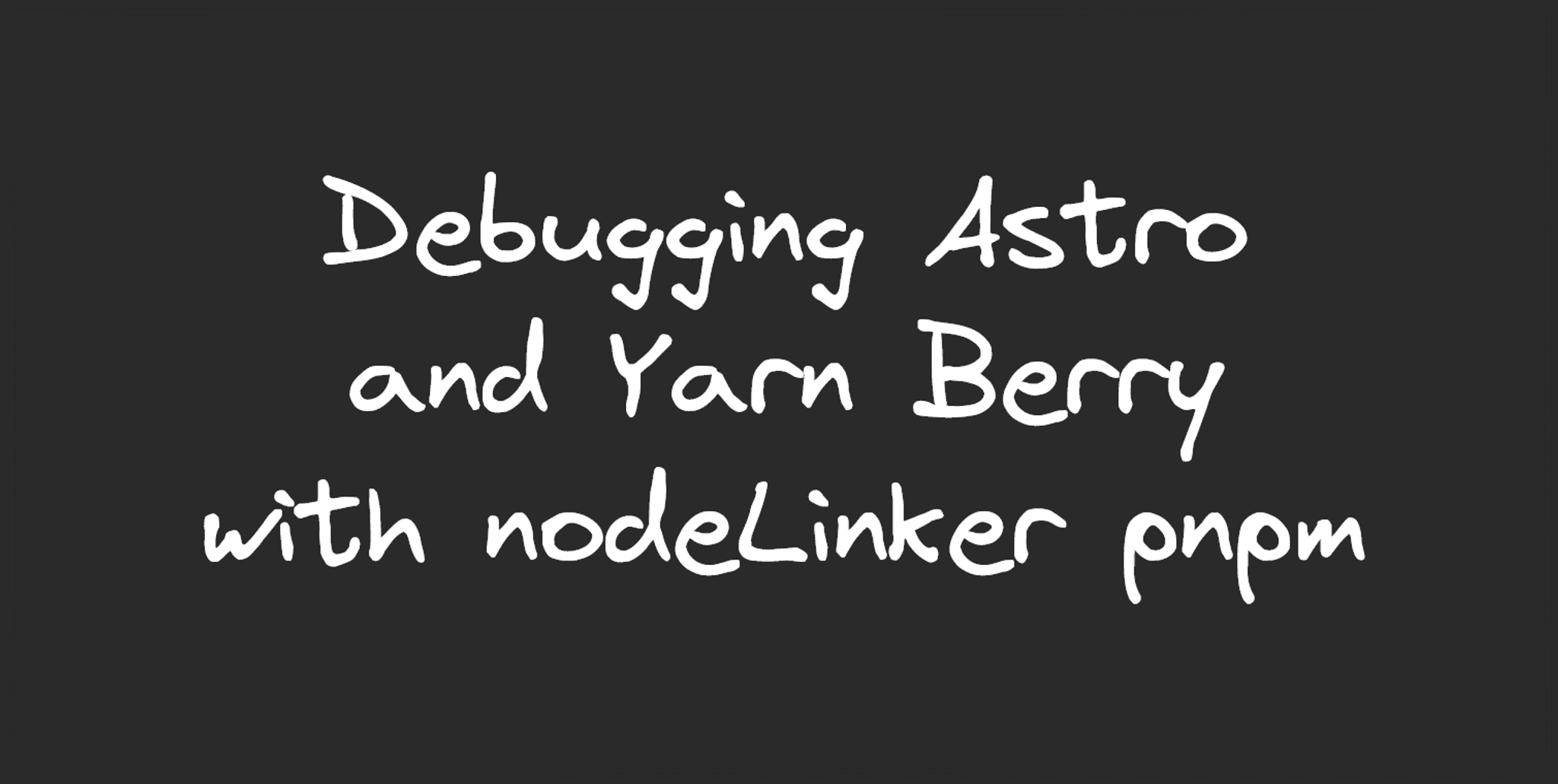Debugging Astro and Yarn Berry + nodeLinker pnpm

Table of Contents
- What, I thought
pnpmis a similar tool to npm and Yarn? - The issue: using Astro with React Integration
- So, what exactly happens here?
- So, is the solution simply just to install
vitein our host project? - Summary
Hey, everyone! Hope you are all doing well, in this post, I’m going to do a quick share about my experiences in debugging stuff when I was building something with Astro and Yarn Berry (with `nodeLinker: pnpm`).
What, I thought pnpm is a similar tool to npm and Yarn?
Yes, that is true, from a perspective. However, Yarn happens to have this thing called nodeLinker. There are 3 values available for this config:
`node-modules`, which is the default one (used in Yarn Classic and npm).`pnp`, which is a mode where we don’t use`node_modules`. Instead, there are two files called`.pnp.cjs`and`.pnp.loader.mjs`. An example can be seen in this astro-yarn-berry-pnp repository. To have the best development experience, we are required to set up Editor SDKs.`pnpm`, which is a somewhat middle ground between`node-modules`and`pnp`. While`pnp`completely “flattens” the dependency structure and`node-modules`mode has a chance for hoisting issues,`pnpm`can be seen as the best of both worlds. It still creates a`node_modules`folder, but it uses symlinks so that the packages and dependencies can find each other.
The issue: using Astro with React Integration
I have prepared this sandbox here, containing a setup of a broken Astro with React integration. The error is as follows:
error Cannot find package 'vite' imported from /workspaces/workspace/node_modules/.store/@vitejs-plugin-react-virtual-8d8f5dfd7e/node_modules/@vitejs/plugin-react/dist/index.mjsError [ERR_MODULE_NOT_FOUND]: Cannot find package 'vite' imported from /workspaces/workspace/node_modules/.store/@vitejs-plugin-react-virtual-8d8f5dfd7e/node_modules/@vitejs/plugin-react/dist/index.mjs at new NodeError (node:internal/errors:405:5) at packageResolve (node:internal/modules/esm/resolve:782:9) at moduleResolve (node:internal/modules/esm/resolve:831:20) at defaultResolve (node:internal/modules/esm/resolve:1036:11) at DefaultModuleLoader.resolve (node:internal/modules/esm/loader:251:12) at DefaultModuleLoader.getModuleJob (node:internal/modules/esm/loader:140:32)This happened right after I did `yarn astro add react`, which is exactly the command from the guide in the @astrojs/react documentation.
So, what exactly happens here?
From the error, we could see that somewhat the package `@vitejs/plugin-react` can’t find `vite`. Curious, right? Now let’s inspect the `package.json` of `@vitejs/plugin-react` deeper. Is the `vite` dependency not included in the `package.json`?
{ // ... "dependencies": { "@babel/core": "^7.22.20", "@babel/plugin-transform-react-jsx-self": "^7.22.5", "@babel/plugin-transform-react-jsx-source": "^7.22.5", "@types/babel__core": "^7.20.2", "react-refresh": "^0.14.0" }, "peerDependencies": { "vite": "^4.2.0" }}OK, it seems like `vite` is defined in the `package.json`, but as `peerDependencies`. Now, what is `peerDependencies`? According to the npm documentation of peerDependencies, it is a field in `package.json` that specifies the list of dependencies that the “host project” should include.
Alright, with that in mind, we will ask, “Who installs this `@vitejs/plugin-react`?” Since this error only started happening after we installed `@astrojs/react`, we can be sure that it’s the culprit. So, let’s inspect the `package.json` of `@astrojs/react`.
{ // ... "dependencies": { "@vitejs/plugin-react": "^4.0.4", "ultrahtml": "^1.3.0" }, "devDependencies": { "@types/react": "^18.2.21", "@types/react-dom": "^18.2.7", "chai": "^4.3.7", "cheerio": "1.0.0-rc.12", "react": "^18.1.0", "react-dom": "^18.1.0", "vite": "^4.4.9", "astro": "3.2.3", "astro-scripts": "0.0.14" }}Okay, so it defines `@vitejs/plugin-react` as `dependencies` and `vite` as `devDependencies`. What does this mean? This means that, when we’re installing from the package registry (e.g. npm registry), it will install `@vitejs/plugin-react` and `ultrahtml`, but not others that are defined in `devDependencies`. This is because `dependencies` are “transitive” dependencies, which are installed at all times, whereas `devDependencies` will only be installed when we’re developing the package on our local machine.
So, that’s the answer to why `vite` is not defined, because we don’t install it.
So, is the solution simply just to install vite in our host project?
Yes, installing `vite` on the host project seems to do the trick, as could be seen in this sandbox, the Vite-related error doesn’t show up anymore. However, this seems to be fixed only if we’re working on a single-repo setup. What if we are using monorepo?
For monorepo, it’s more tricky. I have created a sandbox that reproduced the monorepo example. Here, we have a structure like the following:
package.jsonpackages├── astro│ ├── ...│ └── package.json├── ...└── yarnrc.ymlNow, the difference between the monorepo structure and single project structure is that, I think in monorepo there are some kind of hoisting issues that caused `@astrojs/react` to not be able to find `vite`, despite that we have installed `vite` inside the `astro` monorepo package. So now, what do we do? I found out that we might need to play around a configuration in `yarnrc.yml` called packageExtensions. Here’s what we’re adding:
packageExtensions: '@astrojs/react@*': peerDependencies: vite: '*'What do the above additions do? So, we have learned that `@astrojs/react` doesn’t have `vite` transitive dependency in it, right? And in this case, we have also installed `vite` in our `astro` monorepo package. So, what’s missing is that, the “bridge” between `@astrojs/react` and our `astro` monorepo package. We can implement that “bridging” by “patching” the `peerDependencies` of `@astrojs/react`. By adding `vite` into its `peerDependencies`, we tell `@astrojs/react` that, “Hey, the `vite` package is installed, but not here. It’s installed in the host project.”
And, voila! Now you will be able to run Astro without any errors, because `@vitejs/plugin-react` will ask `@astrojs/react` for `vite`, and `@astrojs/react` will ask the monorepo package `astro` for `vite`, which we have installed already as a `devDependencies`. This sandbox demonstrated the fix.
Summary
So, what do you do when you face dependency-related errors? Say, dependency A is missing.
- First, check if dependency A exists in the
`package.json`of the dependency that requires it (say, dependency B). - If dependency A exists in dependency B’s
`package.json`and somehow it’s missing from`node_modules`, maybe it’s a good time to re-`yarn`. - If dependency A exists in dependency B’s
`package.json`but only as`peerDependencies`, ensure that our project has dependency A installed. - If we have installed dependency A in our project but somehow we can’t still resolve the dependency, then we might need to “link” (or “patch”) dependency B’s
`package.json`using`packageExtensions`.
Hopefully, that’s useful. Until next time and stay safe!